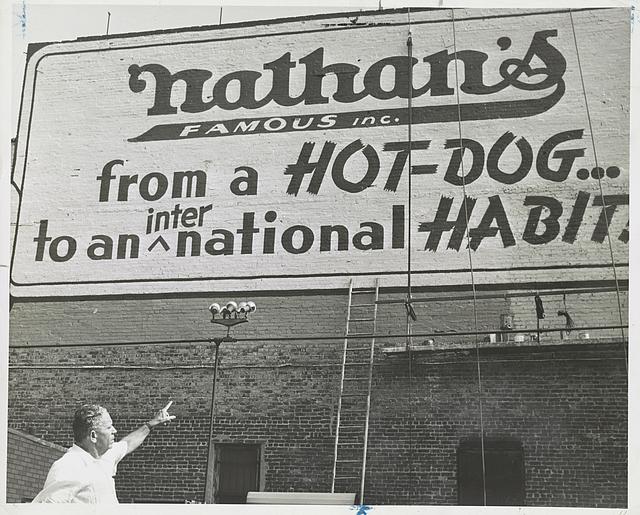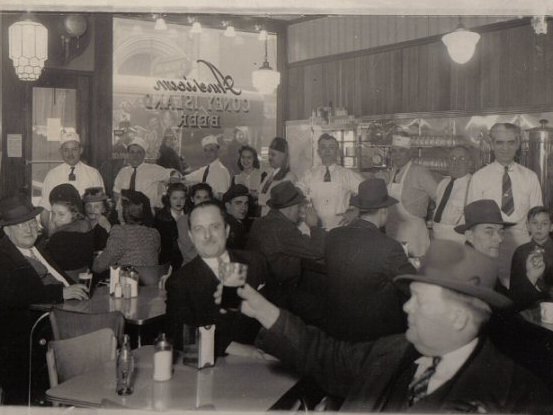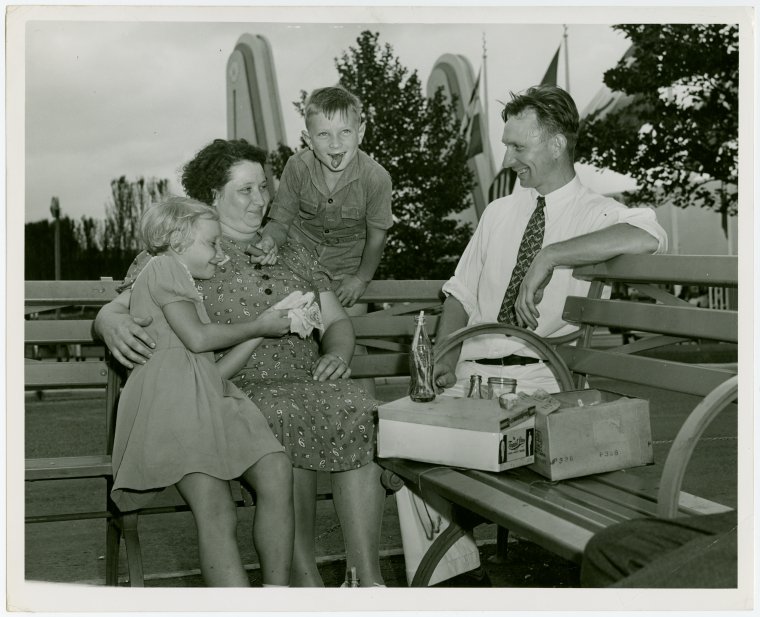Food History
The All-American Hot Dog? A Group Effort

Foreign food with Dick and Jane? These children enjoy hot dogs at the 1939 NY World’s Fair. Photograph courtesy of the New York Public Library.
When you think of the most quintessentially “American” foods, what comes to mind? Surely right up there with apple pie and fried Twinkies is the hot dog. As American as it gets, you say? As American as the open road, baseball, and Bruce Springsteen? Well, think again.
You might know that hot dogs are really “frankfurters,” so named for their city of origin: Frankfurt am Main in Germany. Traditionally, this German-style sausage is a mixture of pork and beef. Arguably, the frankfurter was made popular in the United States by a Polish immigrant named Nathan Handwerker, whose frankfurter recipe was created by his wife, Ida. Nathan opened his stand – aptly called Nathan’s Famous , though Ida’s Famous might be more accurate – at the Coney Island amusement park in 1916, and the crowd went wild. Nathan’s Famous soon moved to a brick-and-mortar location and continues to bring happiness to millions of visitors a year.

An “international habit” alright but one with international origins. Photo courtesy of the Library of Congress.
But wait! Most red, white, and blue-blooded Americans call these special sausages “hot dogs” not “frankfurters”! So where did the term “hot dog” come from? That name actually predates Nathan’s Famous by 24 years. Fred Shapiro, a research librarian at Yale, traced the first instance of the word “hot dog” to Paterson, New Jersey. One man, Francis Xavier Morris, began offering “hot dogs” to the citizens of Paterson as they gathered to skate, go to festivals, or for many other reasons. They were a huge hit. Francis Xavier Morris was Caribbean. He emigrated to the United States and later traveled Europe with his wife, who was European. Perhaps it was his European encounters with the frankfurter that gave him an edge on the trend. But his creative and hugely successful naming of the food – that may have been all his own.
Okay, so immigrants had a lot to do with bringing hot dogs to the United States. But at this point, they are now in the hands of born and bred Americans, right? Well, yes and no.

American Coney Island in an early photography. Photo courtesy of National Public Radio and Grace Keros.
“The Coney” is perhaps one of the most popular iterations of the hot dog. Its story is a classic immigrant tale. In the early twentieth century there was a huge burst of Greek immigration to the United States. For all the reasons immigrants congregate in one area – security, language assistance, cultural support – Greek immigrants tended to gather in Detroit. However, before heading to the Motor City, most of these immigrants came through New York. Any number of these immigrants could have brought hot dogs to Detroit, but two brothers, William “Bill” Keros and Constantine “Gust” Keros, were the first to really start the Coney –style hot dog – at least in its early incarnation. Not to be confused with a regular hot dog, “the Coney” is a special combination of a hot dog with chili sauce, mustard, minced onion, and a steamed bun. At the time, Detroit was the place to be. The Ford Motor company reportedly paid their workers $5 a day in the 1920s (almost a month’s rent here on the Lower East Side). The Keros brothers saw the market for a quick lunch. They opened American Coney Island on the corner of Mission and Lafayette in Detroit, where it still sits today. Despite their immense success, the brothers soon had a falling out, and in 1936, Bill opened Lafayette Coney Island. The rivalry continues and so does the empire. As Greek families moved into the suburbs of Detroit, so did the Coney franchises. The Keros family still owns Coney franchises all over the state.
So the story of the hot dog is undeniably American, but only in that the American Dream is truly one of immigration.
Written by Julia Berick & Katie Heimer
